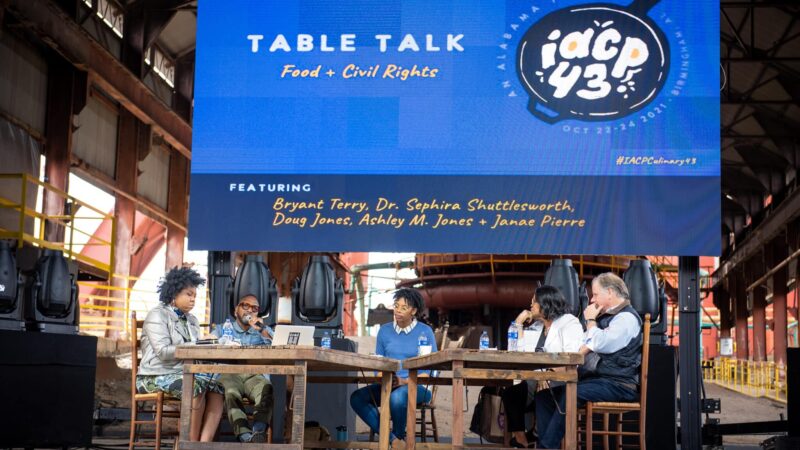Culinary professionals eat up discussion on food and civil rights
IACP's Table Talk session on food and civil rights featuring (from left to right) Ashley M. Jones, Bryant Terry, Janae Pierre, Sephira Shuttlesworth and Doug Jones.
When you think about the intersection of the food and the civil rights movement, you may think of sit-ins at lunch counters or bake sales that funded boycotts. But the relationship between food and civil rights goes much deeper.
In late October, WBHM’s Janae Pierre moderated what was called a “Table Talk” session on that topic during the International Association of Culinary Professionals’ (IACP) conference in Birmingham. Here is her reporter’s notebook from that event.
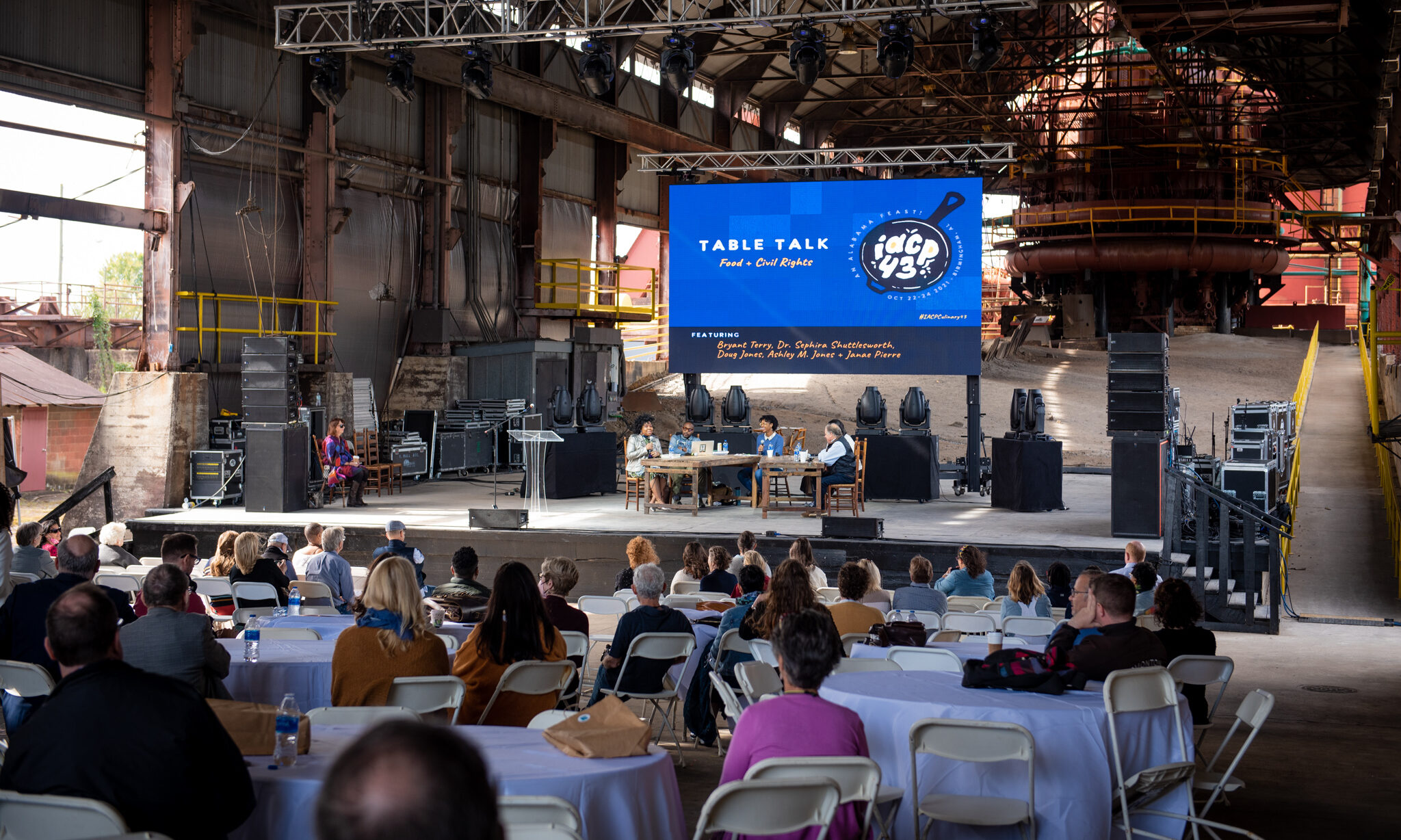
Andi Rice,Mediaworks
The audience listens attentively during IACP’s Table Talk session on food and civil rights.
The train whistled and the wind howled as hundreds filled the casting shed at Sloss Furnaces that morning. It may have been chilly outside but before the discussion began, chef, food justice activist and author Byrant Terry took us into the warmth of his grandmother’s kitchen as he sang, “Glory, glory, hallelujah, since I lay my burdens down.”
His grandmother would sing that song as she prepared Sunday dinners.
Terry was joined on the panel by Sephira Shuttlesworth, the widow of Birmingham civil rights leader Reverend Fred Shuttlesworth. Also Alabama poet laureate Ashley M. Jones, and former U.S. Senator Doug Jones (no relation). Doug Jones admitted he’s a little out of place on the panel.
“I’m really happy to be here although, number one, I don’t sing, number two, I don’t do poetry. Umm, I love food,” he said.
Everyone at the event had a love for food, including myself. When asked to lead the discussion on food and civil rights, I immediately thought about the state of Alabama and its painful past; from lynchings to Bloody Sunday where hundreds of Black people were beaten by state troopers in the march from Selma to Montgomery. Plus, all the turbulent events, like the Children’s Crusade, that occurred in Birmingham, which Doug Jones called the epicenter of the civil rights movement.
“You can talk about Montgomery, you can talk about Albany, you can talk about Memphis, and events happened there, but for Birmingham,” he said. “And more importantly, all of those kids who took to the streets, the youth of this city who took the brunt of that, the fire hoses and the dogs, they are the ones that really were the heroes, in my view of the movement.”
The movement needed healing to press on through the pain and trauma. For most in the fight, that came in the form of a good meal, both literally and figuratively.
“Being fed doesn’t just mean by food, of course, spiritually fed,” said Ashley M. Jones.
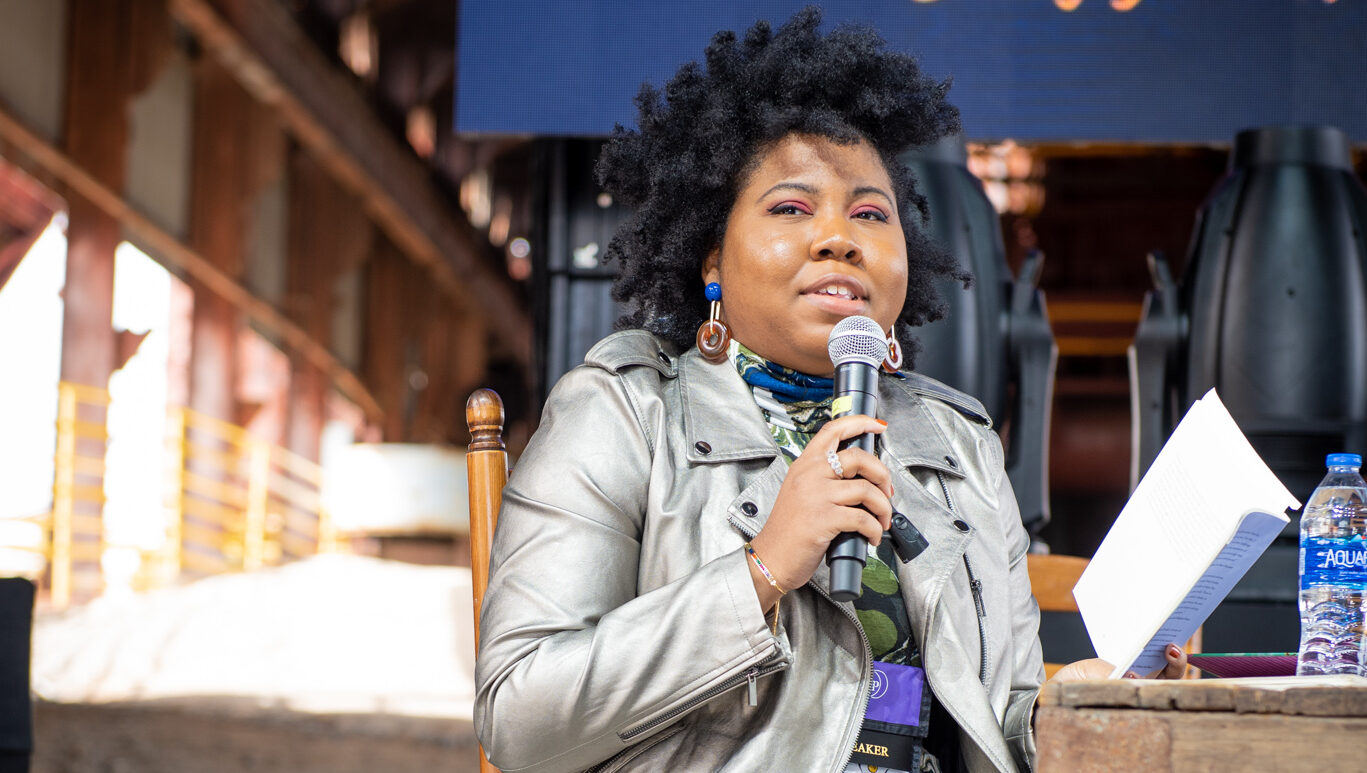
Andi Rice,Mediaworks
Ashley M. Jones shares a poem during IACP’s Table Talk session on food and civil rights.
“I think we are always feeding each other and finding ways to survive. There is so much trauma. The trauma that we live through is so difficult. It’s hard to find sustenance to make it to the next day. So, we have always found a way to feed each other,” she said.
For Black people in Alabama, Jones said, that trauma was heightened during the civil rights movement and it still stings today.
Sephira Shuttlesworth recalled that, back then, Black women in the kitchen brought comfort to the bellies of those beaten, physically and mentally, during the fight for equality.
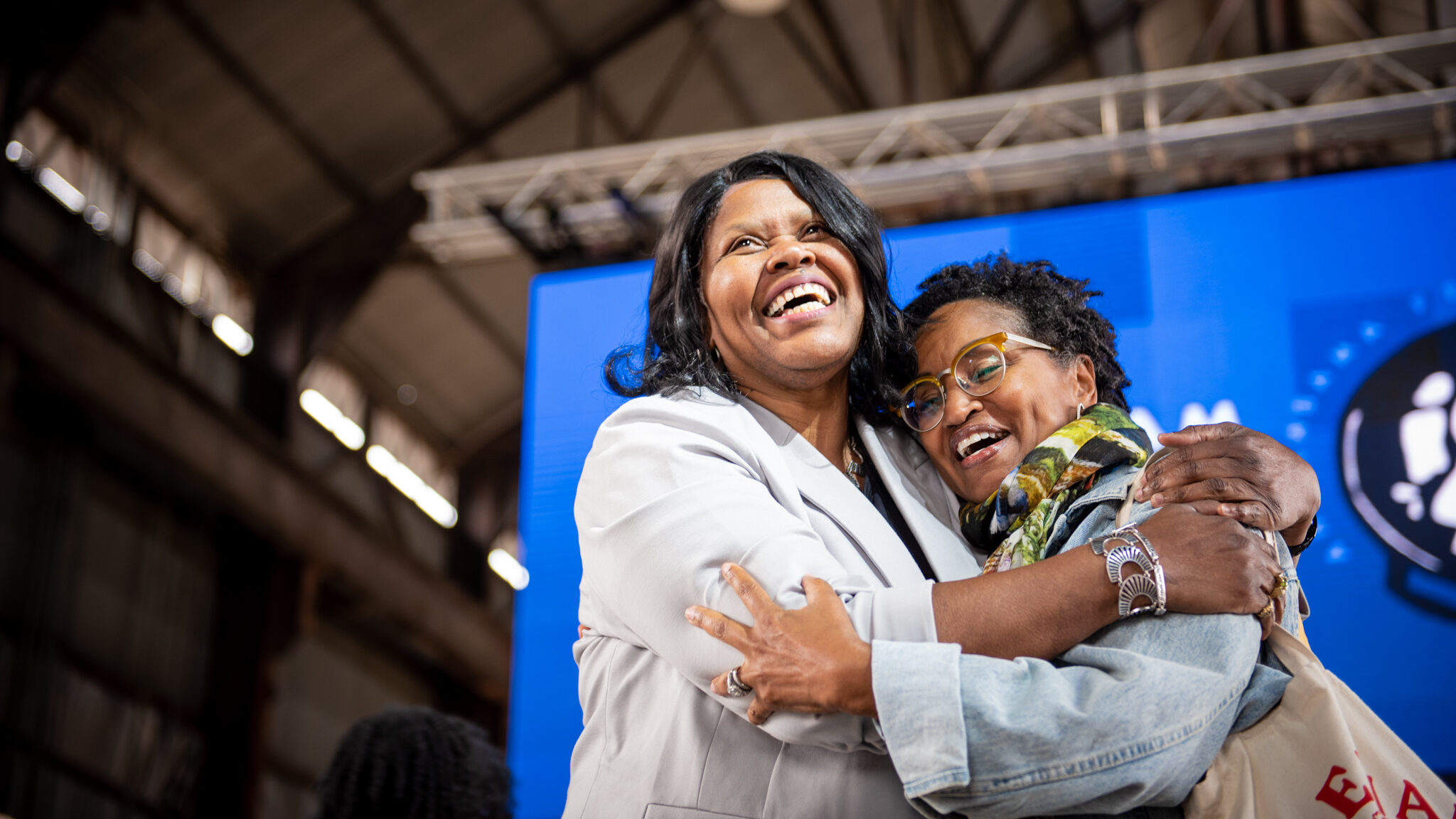
Andi Rice,Mediaworks
Sephira Shuttlesworth greets an IACP attendee during the conference’s Table Talk session on food and civil rights.
“We’ve healed many a sores, many a deep cut in those kitchens … blackberry cobbler, squash and onions, pork chops with gravy smothered,” she said. “Black women in the kitchen. We took those burdens and we made something of them. We took what was left over and we made something of it.”
Shuttlesworth continued to fire up the crowd with her menu of comfort food born from hardship. And Doug Jones could relate. Though he admitted his life is one of white privilege, he’s had plenty of “soul feeding” moments with Black families. The message this day was that progress in the South rests in the homes of Black women.
As the discussion wrapped up, the train whistled again and Shuttlesworth began singing an old spiritual.
“I’m gonna lay down my burden, down by the riverside,” she sang.
The moment felt poetic. The images endure of sit-ins at lunch counters and civil rights leaders strategizing at meat-and-threes. But food’s full contribution to the civil rights movement was one giving people the strength to keep going while offering a balm to the soul.
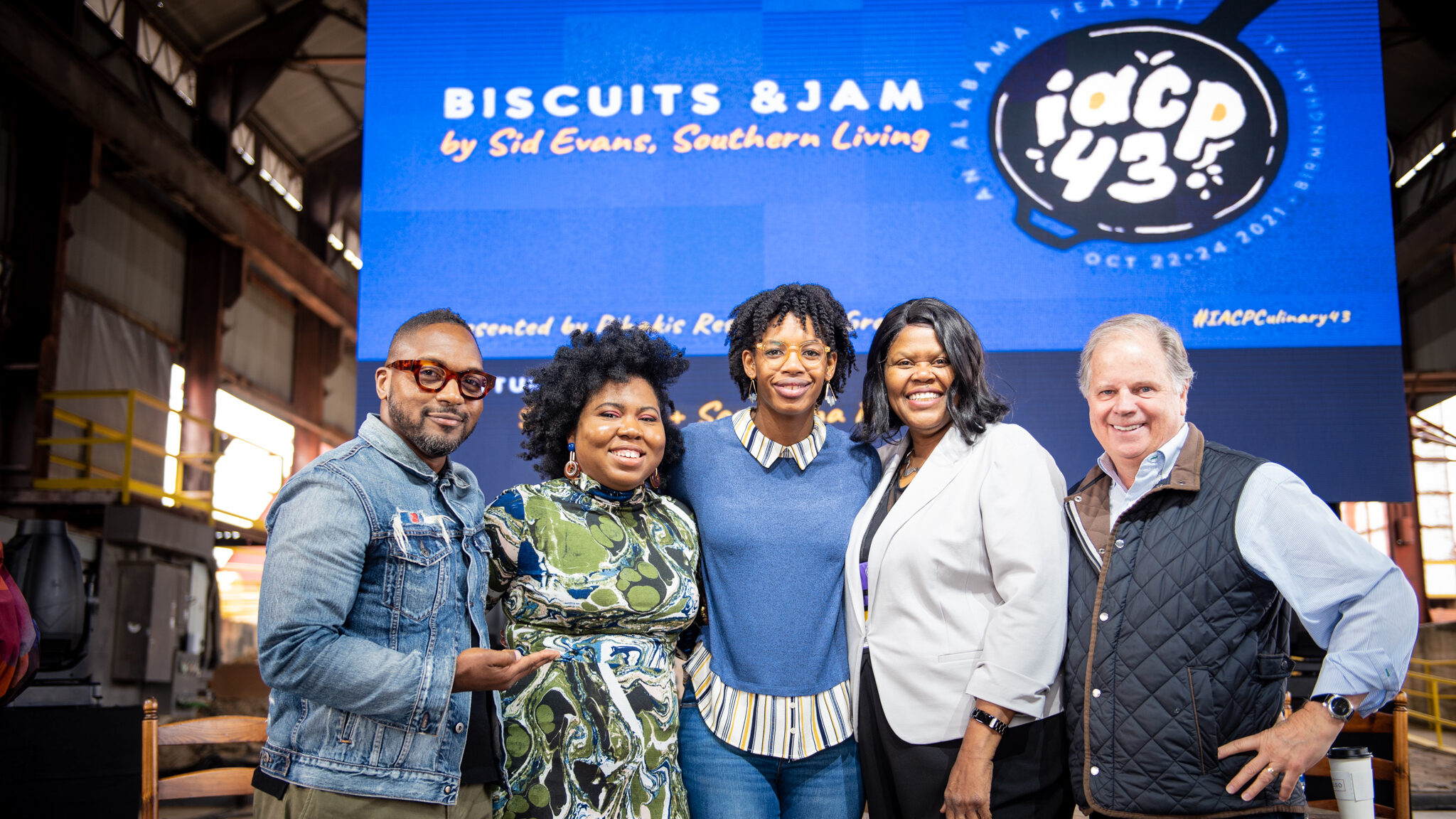
Andi Rice,Mediaworks
(From left to right) Bryant Terry, Ashley M. Jones, Janae Pierre, Sephira Shuttlesworth, Doug Jones at the IACP Conference in Birmingham.
Increase in military aid to Ukraine marks a shift in White House policy toward Russia
The Pentagon and U.S. military officials in Europe are working with NATO members to ship more Patriot missile systems to Ukraine and release more munitions that were briefly halted.
U.S. senator wants DOGE out of sensitive payment system for farmers
Sen. Tammy Baldwin, D-Wis., wants the USDA to revoke high-level access granted to the Department of Government Efficiency to a database that controls payments and loans to farmers and ranchers.
Lawyer says an Alabama teen who was killed by police was shot in the back
Authorities have not released police body camera video of the June 23 encounter or disclosed the name of the officer who shot 18-year-old Jabari Peoples in the parking lot of a soccer field in the affluent Birmingham suburb of Homewood. They also haven't released the findings of the county's official autopsy.
An Israeli restaurant owner quits a controversial Gaza food program after criticism
Shahar Segal, who runs popular restaurants around the world, has left his role as a spokesman for the Gaza Humanitarian Foundation amid calls to boycott his businesses.
Trump’s pick for U.N. Ambassador grilled over Signal chat scandal
Former national security adviser Mike Waltz, who was removed from office amid the Signal chat controversy, spent Tuesday in the Senate confirmation hearing for his nomination as U.S. ambassador to the United Nations.
5 takeaways from the 2025 Emmy nominations
Apple TV+ must be happy about how many nominations they've raked in this year for hit shows including Severance and The Studio, NPR critic Linda Holmes says.

